The scent of sizzling pupusas and hot tamales mingled with the smoky tang of pho-seasoned chicken wings. Music spilled into the courtyard of a 400-year-old monastery-turned-Secretariat of Culture headquarters in downtown Guadalajara, where a crowd gathered beneath colorful banners. On stage, a Chicano rapper who goes by Wombay welcomed the audience with a freestyle, his rhymes weaving between English and Spanish. Around him, stalls brimmed with Cuban, Salvadoran, Peruvian, Indian, Vietnamese, Palestinian, and Mexican dishes.
This was the 3rd Feria Gastronómica y Cultural, held on September 21 to mark the World Day of Migrants and Refugees. Organized by The Rhizome Center for Migrants, the festival brought together more than 30 chefs, artisans, musicians, and community leaders, each one carrying a story of migration, resilience, and belonging.
Para leer este artículo en Español ir a Festival del Día del Migrante: Un Mosaico Vivo en Guadalajara
A celebration to honor those who come from afar
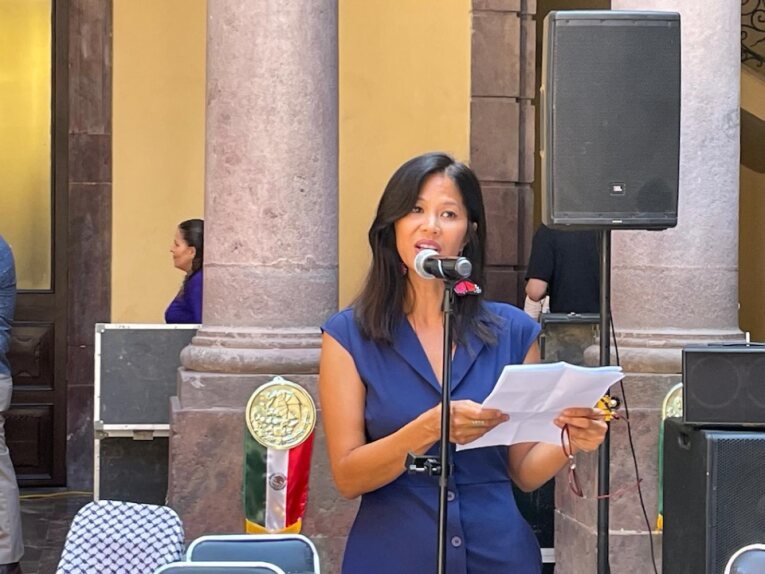
Tran Dang, founder of the Rhizome Center and the festival itself, took the stage to open the afternoon. “Through food, stories, and music, we honor the dignity and resilience of all people who have migrated,” she told the crowd. “We celebrate the bonds, friendships, and communities that are created when people cross borders.”
Her words set the tone for the day. Migrants had come to Guadalajara from Haiti, Vietnam, Egypt, Venezuela, Cuba, Syria, Taiwan, and beyond. Some had arrived for work or study. Some stayed for love — “me included,” Dang quipped. Others fled violence, war, and political instability, or came after deportation forced their families back to Mexico.
“In times when migration in the Americas is marked by mass violation of rights, displacement, and uncertainty, our festival offers another side of migration: one of community, solidarity, and warmth,” Dang said.
The Rhizome Center, which she founded in 2018 in response to a surge in deportations under the Trump administration, has become a lifeline for deported and returning migrants. Its legal clinic helps people obtain documentation, fight immigration cases, and access schools, health care, and government services. “Deportation is not a moment in time,” Dang reminded the audience. “As long as someone is deported, they will continue to experience deportation.”
Stories served on a plate
If the speeches framed the festival’s mission, the food told the story in its own language.
At the Salvimex stand, a family from Sonsonate, El Salvador, prepared pupusas by hand. For them, pupusas are more than a dish — they are connection, nostalgia, and joy. “Through our food, we share memories and bring a taste of home to fellow Salvadorans while introducing others to our culture,” they explained.
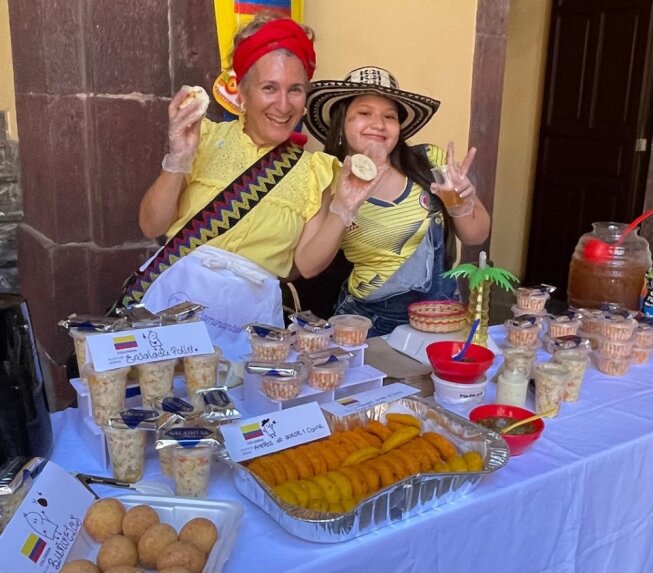
Nearby, Ruby, a Muslim cook from northern India, ladled out fragrant Mughal-inspired curries. After years of struggling for residency in Guadalajara, she launched her project, Marhaba Kitchen, with the help of her husband. “Cooking is my way to connect,” she said. “Being part of this festival is a blessing. We want people to discover India through our food and stories.”
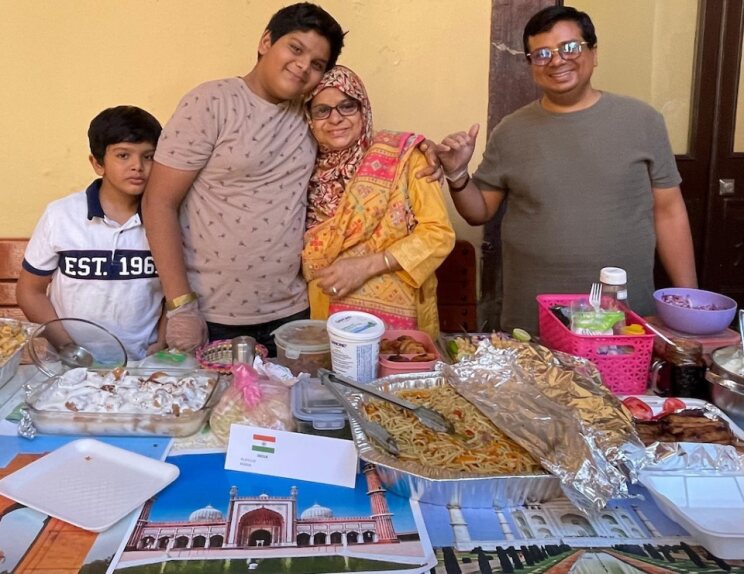
From Cuba came Rossana, offering a different take on tamales — stuffed with meat, but also with vegan and vegetarian options. Making tamales, she said, connects her to her mother and to Cuba’s Virgen del Cobre, whose stone she carries as a reminder of home.
At another table, Nelida from Pucallpa, Peru, shared la causa, a potato-based dish that originated in the independence era when women sold it “para la causa” — for the cause of freedom. For her, serving it today is a way of keeping her roots alive. “If you come to my home, you will find the flavors of Peru,” she said.
Lily Walker, a British chef who has lived in Guadalajara for 20 years, offered a taste of Palestine — dishes from Gaza that use jalapeños and chiles familiar to Mexican palates. “Many cultures are connected by ingredients that, in fact, are the same,” she said. Though not Palestinian herself, she saw her participation as a way to support the people of that region.
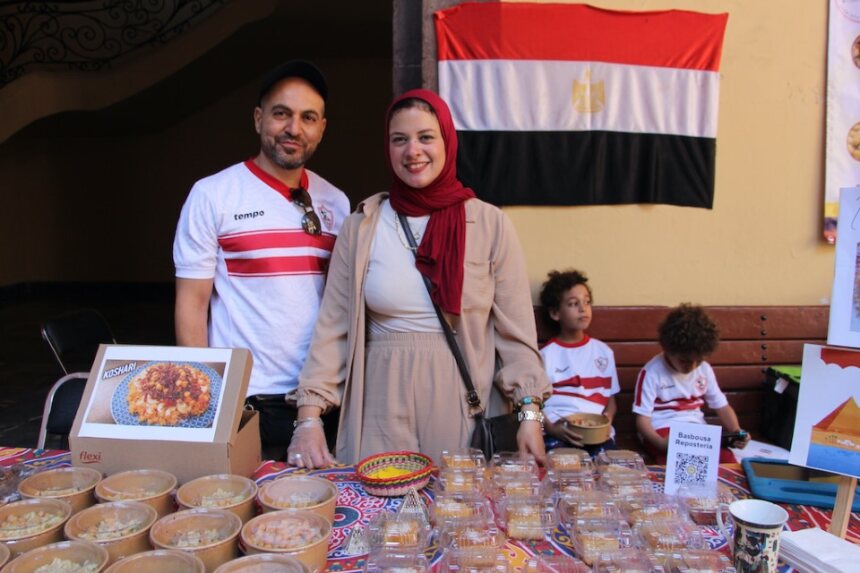
Charlie, owner of Let’s Pho, served Vietnamese wings with vegetarian and gluten-free options. “Food is not just a recipe,” he said. “It’s your identity, your culture, all mixed into one.”
Not all offerings were edible. Habibah, a Guadalajara-born Muslim convert, shared henna designs, painting intricate patterns on festival-goers’ hands. “For me, henna is about cultural connection and art on the skin,” she explained. Her work, rooted in solidarity with migrants, grew from painting women in her community into a practice of intercultural sisterhood.
Voices of solidarity
The festival also gave the stage to organizations that work year-round with migrants.
Father Alberto Ruiz, founder of Casa del Migrante, reminded attendees that hospitality is part of Guadalajara’s character. His shelter has hosted thousands of migrants, from Central America to Africa, sometimes receiving caravans of up to 2,000 people in a single day. Today, it maintains three houses that provide food, legal help, and schooling for migrant families.
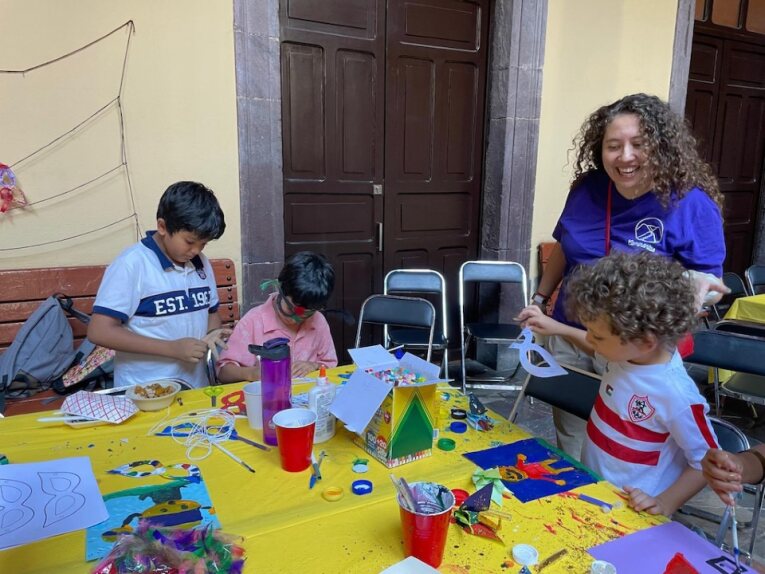
From Caminantas, a network of migrant women, came Silvia Umaña, who described migration as “a recipe of nostalgia mixed with hope.” For her, the kitchen is a space of resilience, where women share their strength as well as their food. “It is our own stories, so different yet so similar, that unite us and remind us that accompanying each other is the way to become stronger and more human,” she said.
And then there was Wombay, the MC whose own story embodied the themes of the day. Deported as a child when his father was expelled from the U.S., he struggled to adapt to life in Mexico. Music, he said, became his lifeline. “All we need is love, and to have a good time with each other,” he told the crowd. “Borders shouldn’t be a reason we cannot come together and enjoy each other’s culture.”
A community of support
Behind the festival’s colorful stalls was a network of solidarity. Local heavyweights Santo Coyote and Barrio Toyo donated all proceeds to the Rhizome Center, joined by Speakeasy Cocina and Las Hermanas Artesanal. Other long-term supporters included Tres Flores, a migrant-run clothing shop, and Calo Agency, a bilingual marketing firm.
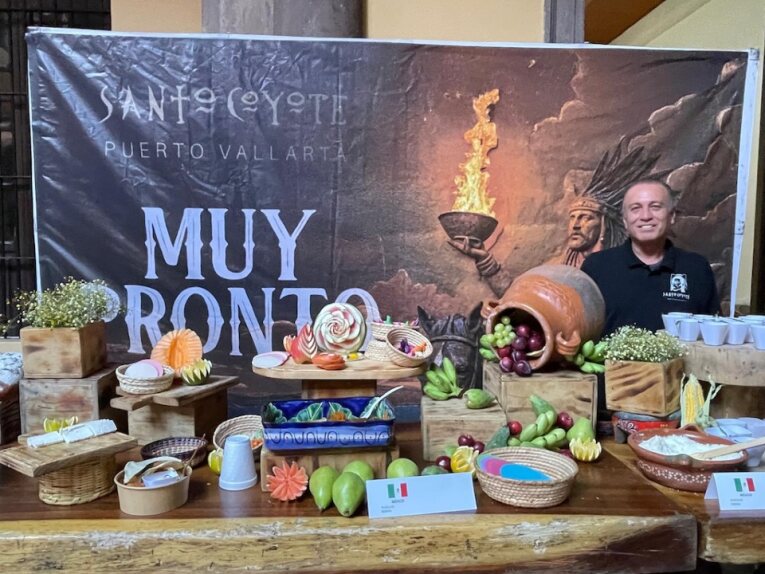
Community groups also pitched in: the American Legion Post 17, TWIG (This Week in Guadalajara), Foodies Group GDL, Black in Guadalajara, and the Alianza Francesa. Students from the American School Foundation volunteered throughout the day, setting up tables and welcoming guests. Together, the event raised more than 40,000 pesos to help create a safe emotional space for returning and deported migrants.
From crisis to hope
For many in the crowd, the festival was more than food and music — it was a glimpse of another way to see migration. In contrast to the headlines of deportations and displacement, here was a vision of community, creativity, and belonging.
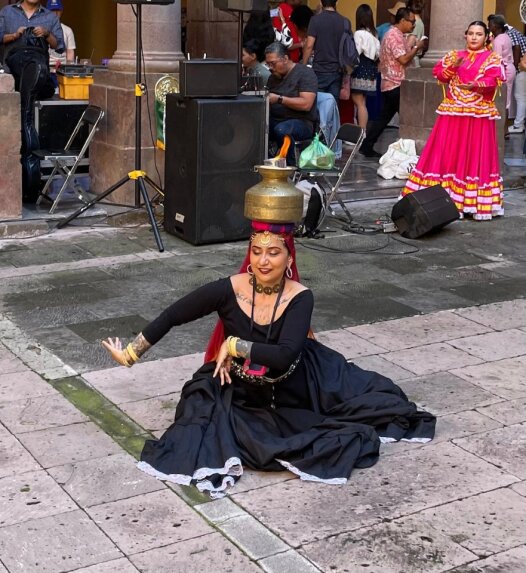
As Dang reminded the audience, migration is not only a story of suffering. “Despite the many difficulties — each day worse and worse — migration represents hope for the future,” she said.
By the end of the afternoon, the courtyard was full of laughter, music, and the clatter of dishes. Migrants and Tapatíos sat side by side, sampling flavors from across the globe, discovering that what they shared was often greater than what divided them.
“May today fill your heart and strengthen our sense of home, community, belonging,” Dang said in closing. “Thank you for coming.”
Follow The Rhizome Center on Instagram at @therhizomecenter; or reach out to the organization by WhatsApp at +52 33 2182 0836.
This story was originally posted at The Guadalajara Reporter and it’s shared here with permission.